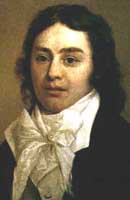Human Life Comments
If dead, we cease to be ; if total gloom
Swallow up life's brief flash for aye, we fare
As summer-gusts, of sudden birth and doom,
...
Read full text
This is a reductio ad absurdum against those who deny the immortality of the soul. There is nothing bleak or nihilistic about this poem. This is the perfect marriage of verse and logos.
Instead of reading this poem as kind advice to a likeminded other, try reading it as Coleridge––who did not believe that once 'dead, we cease to be'––attempting to persuade an atheist that human life is indeed meaningful, and that our life is not 'Blank accident! nothing's anomaly! ' Those who believe, however, that human life is merely 'Blank accident', have no reason by their own premises, Coleridge is arguing, to be sad––or glad.
..Thy being's being is contradiction. Often times we seem to wonder the true purpose of our existence. If death could but have no effect on us, would life still be of value? This I keep pondering every now and then. Great work Sire!
I could not enjoy life as something meaningless- - - - - - -Be sad! be glad! be neither! seek, or shun! Thou hast no reason why! Thou canst have none; Thy being's being is contradiction.
Life and death both are contradictory and exist only in the absence of the other.
Human life is indeed a big contradiction according to S T Coleridge! Rejoicing or loathing in life cannot change death if our life is brief or big in this world that even Milton knew pretty well! Ah! What a bold exposition about human life in this ephemeral world!
Nature's dread activity; not forgetting that of the wicked ones among us today. Nice piece of work.

nice one, beautifully written